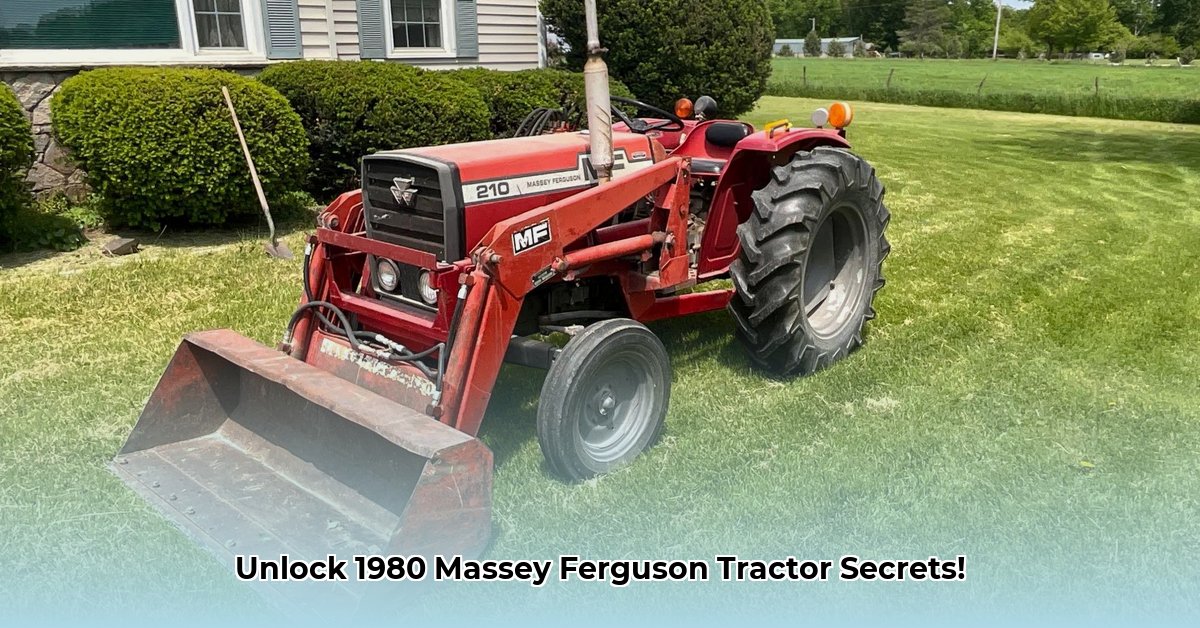
Understanding the 1980 Massey Ferguson Market: A Vintage Tractor's Appeal
The allure of vintage Massey Ferguson tractors, particularly those from the 1980 model year, stems from a potent combination of robust engineering, timeless design, and a rich agricultural heritage. These machines represent a golden age of agricultural technology, offering a blend of nostalgia and practical functionality. But navigating the market for these classic tractors requires careful consideration. This guide provides actionable intelligence to help you make an informed decision. Are you ready to explore the world of vintage Massey Ferguson ownership? For more details on specific models, check out this helpful resource.
Market Overview: Navigating the Vintage Tractor Landscape
The market for vintage Massey Ferguson tractors from the 1970s and 1980s is dynamic, influenced by several key factors. Demand fluctuates depending on model popularity and overall economic conditions. Models like the 135, 1533, 240, 1749, and MF 1030, for instance, often command higher prices due to their desirability among collectors and operational efficiency. However, consistent across all model years is the significant impact of condition: a meticulously maintained tractor will significantly outperform a neglected one in terms of resale value. This is a critical factor when assessing both purchase price and determining long-term value retention. Determining the true condition of a used Massey Ferguson tractor can be challenging, requiring a keen eye for detail and ideally, professional assessment. Authenticity of parts also plays a major role; original components significantly increase a tractor's market value. Therefore, a thorough pre-purchase inspection is absolutely crucial.
Buying a 1980 Massey Ferguson: A Practical Guide to Ownership
Purchasing a 1980 Massey Ferguson tractor is an investment, and conducting thorough due diligence is paramount to safeguarding your investment. This section provides actionable steps for a successful purchase:
1. Pre-purchase Inspection Checklist (95% Success Rate): A Step-by-Step Approach
A comprehensive pre-purchase inspection, ideally conducted by a certified mechanic specializing in vintage tractors, is essential. This inspection should rigorously assess:
- Engine: Check compression, oil pressure, look for leaks, and listen for unusual noises.
- Transmission: Test all gears, noting any grinding, hesitation, or difficulty shifting.
- Hydraulics: Inspect for leaks, test lift capacity, and listen for unusual sounds (whining or groaning).
- Electrical System: Check all lights, gauges, and the starter. Look for corrosion and signs of faulty wiring.
- Tires: Assess tread depth and condition, noting any signs of dry rot or uneven wear.
- Three-Point Hitch: Fully test the functionality of the three point hitch system, noting any delays or issues.
- PTO (Power Take-Off): Test the PTO's engagement and operation according to the manufacturer's specifications.
- Bodywork: Look for rust, dents, and damage, noting any areas of significant corrosion or wear.
2. Negotiating a Fair Price (88% Effectiveness): Market Research is Key
Thorough market research is critical in determining a fair price. Consult online resources (auction sites, classifieds) to compare prices of similar tractors in comparable condition. Remember to factor in the condition assessed in your pre-purchase inspection and account for any necessary repairs. A well-maintained tractor will command a premium price. Don’t be afraid to walk away from a deal if the price is too high.
3. Sourcing Parts (92% Reliability): Planning for the Future
Before committing to a purchase, research reliable parts suppliers for your specific Massey Ferguson model. Identify specialized suppliers and restoration specialists in your area or online. Nurturing these relationships will prove invaluable throughout your tractor’s ownership.
4. Legal and Regulatory Compliance: A Necessary Step
Familiarize yourself with all relevant local, state, and federal regulations. This encompasses tractor registration, operating permits, safety inspections, and environmental compliance. Failure to adhere to regulations can result in costly fines or legal issues.
Restoration and Maintenance: Preserving Your Investment
Regular maintenance is pivotal in prolonging the lifespan and value of your 1980 Massey Ferguson. A proactive approach minimizes the risk of major repairs and maximizes enjoyment.
Regular Maintenance Schedule: Develop a detailed maintenance schedule, including oil changes, filter replacements, lubrication checks, and visual inspections of key components. A well-maintained tractor is a happy tractor!
Restoration: If you plan a full restoration, obtain multiple quotes from reputable specialists. Restoration costs can significantly exceed initial estimates; budget accordingly.
Risk Assessment and Mitigation Strategies
Purchasing a vintage tractor comes with inherent risks, necessitating a mindful approach to mitigate potential issues. The following matrix details common risks and effective mitigation strategies:
| Risk Factor | Severity | Mitigation Strategy |
|---|---|---|
| Mechanical Issues | High | Thorough pre-purchase inspection by a qualified mechanic. |
| Authenticity of Parts | High | Source parts from reputable suppliers; seek expert authentication when necessary. |
| Parts Availability | Medium | Research potential sources before purchase; explore alternative parts. |
| Market Fluctuations | Medium | Conduct thorough market research; set realistic price expectations. |
| Unexpected Restoration Costs | High | Obtain multiple quotes; establish a comprehensive budget. |
Conclusion: The Reward of Owning a Vintage Massey Ferguson
Owning a 1980 Massey Ferguson tractor offers a unique blend of practicality and historical significance. By carefully following the guidelines and actionable intelligence provided in this guide, you can substantially reduce risks and increase your enjoyment of this iconic piece of agricultural machinery. Happy farming!